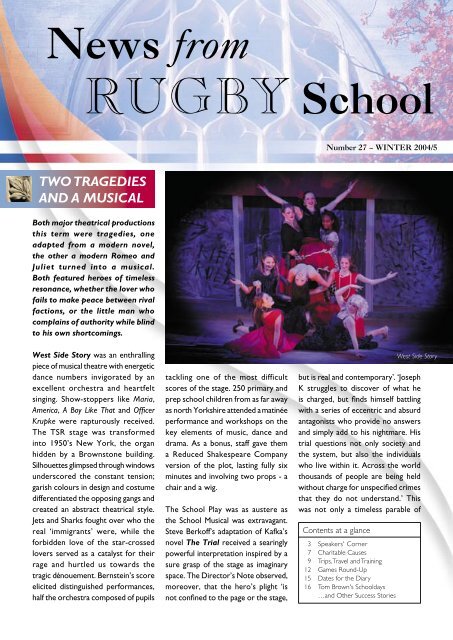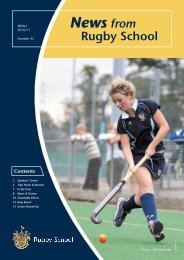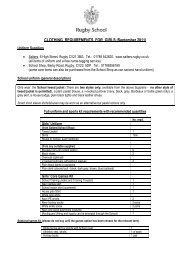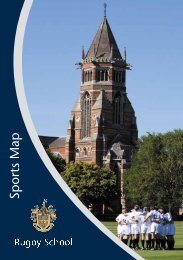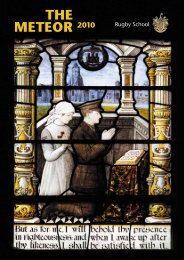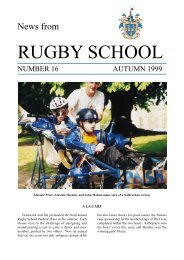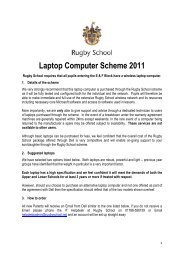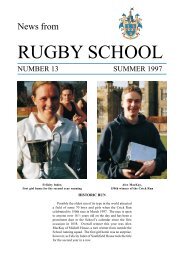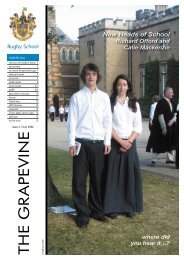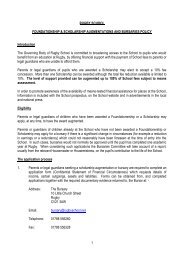Winter 04 | PDF - Rugby School
Winter 04 | PDF - Rugby School
Winter 04 | PDF - Rugby School
Create successful ePaper yourself
Turn your PDF publications into a flip-book with our unique Google optimized e-Paper software.
News from<br />
RUGBY <strong>School</strong><br />
Number 27 ~ WINTER 20<strong>04</strong>/5<br />
TWO TRAGEDIES<br />
AND A MUSICAL<br />
Both major theatrical productions<br />
this term were tragedies, one<br />
adapted from a modern novel,<br />
the other a modern Romeo and<br />
Juliet turned into a musical.<br />
Both featured heroes of timeless<br />
resonance, whether the lover who<br />
fails to make peace between rival<br />
factions, or the little man who<br />
complains of authority while blind<br />
to his own shortcomings.<br />
West Side Story was an enthralling<br />
piece of musical theatre with energetic<br />
dance numbers invigorated by an<br />
excellent orchestra and heartfelt<br />
singing. Show-stoppers like Maria,<br />
America, A Boy Like That and Officer<br />
Krupke were rapturously received.<br />
The TSR stage was transformed<br />
into 1950’s New York, the organ<br />
hidden by a Brownstone building.<br />
Silhouettes glimpsed through windows<br />
underscored the constant tension;<br />
garish colours in design and costume<br />
differentiated the opposing gangs and<br />
created an abstract theatrical style.<br />
Jets and Sharks fought over who the<br />
real ‘immigrants’ were, while the<br />
forbidden love of the star-crossed<br />
lovers served as a catalyst for their<br />
rage and hurtled us towards the<br />
tragic d nouement. Bernstein’s score<br />
elicited distinguished performances,<br />
half the orchestra composed of pupils<br />
tackling one of the most difficult<br />
scores of the stage. 250 primary and<br />
prep school children from as far away<br />
as north Yorkshire attended a<br />
performance and workshops on the<br />
key elements of music, dance and<br />
drama. As a bonus, staff gave them<br />
a Reduced Shakespeare Company<br />
version of the plot, lasting fully six<br />
minutes and involving two props - a<br />
chair and a wig.<br />
The <strong>School</strong> Play was as austere as<br />
the <strong>School</strong> Musical was extravagant.<br />
Steve Berkoff’s adaptation of Kafka’s<br />
novel The Trial received a searingly<br />
powerful interpretation inspired by a<br />
sure grasp of the stage as imaginary<br />
space. The Director’s Note observed,<br />
moreover, that the hero’s plight ‘is<br />
not confined to the page or the stage,<br />
but is real and contemporary’. ‘Joseph<br />
K struggles to discover of what he<br />
is charged, but finds himself battling<br />
with a series of eccentric and absurd<br />
antagonists who provide no answers<br />
and simply add to his nightmare. His<br />
trial questions not only society and<br />
the system, but also the individuals<br />
who live within it. Across the world<br />
thousands of people are being held<br />
without charge for unspecified crimes<br />
that they do not understand.’ This<br />
was not only a timeless parable of<br />
Contents at a glance<br />
3 Speakers' Corner<br />
7 Charitable Causes<br />
9 Trips, Travel and Training<br />
12 Games Round-Up<br />
15 Dates for the Diary<br />
16 Tom Brown's <strong>School</strong>days<br />
…and Other Success Stories<br />
West Side Story
2<br />
News from<br />
RUGBY <strong>School</strong> WINTER 20<strong>04</strong>/5<br />
News from<br />
RUGBY <strong>School</strong> WINTER 20<strong>04</strong>/5 3<br />
metaphysical anxiety rooted in the Law, but an urgent satire<br />
of legal corruption and political irresponsibility today.<br />
The first concert of the academic year was given in Chapel<br />
by the massed members of the full-time music staff. Items<br />
ranged from Beethoven’s sublime Spring Sonata and Elgar’s<br />
Salut d’amour to the ridiculous spectacle of Three Little Maids<br />
from <strong>School</strong>, to wit three dodgy schoolgirls and a Director<br />
of Music doing particularly nasty things to an innocent tuba<br />
on the bass line. A chamber music concert featured eight<br />
different ensembles with repertoire ranging from the 17 th<br />
century to two days before. Three string quartets played,<br />
along with trios and a cello ensemble. The newest piece<br />
was given its world premi re by the newest ensemble: four<br />
percussionists using everyday utensils in their magnum<br />
opus Junk.<br />
Christmas Concert Crooners<br />
Joseph K. Accused<br />
Rachmaninov’s Piano Concerto No.2<br />
The Chapel Choir of 60 voices plus was again on tour,<br />
descending on Bath Abbey one sunny Thursday afternoon to<br />
perform music by Stanford, Rutter and Dunster-Sigtermans<br />
with noteworthy solos by Nicole Wyatt and Richard King.<br />
Thanks to London’s rush-hour traffic four singers arrived<br />
at St Matthew’s Church, Wimbledon with five minutes to<br />
spare to perform English madrigals and part-songs, not to<br />
mention Flanders and Swann. Music played an important<br />
role in the Remembrance Day service, with anthems for<br />
choir and full congregation. Chapel Brass played for the<br />
hymns and gave a moving performance of Purcell’s Funeral<br />
Music for Queen Mary.<br />
Louise Hopkins, professor of cello at the prestigious<br />
Guildhall <strong>School</strong> of Music and Drama, visited us for the third<br />
time in 10 years to give a series of Master Classes. The<br />
day got off to a lively start with all 21 cellists joining in a<br />
hearty rendition of Zemlicka’s arrangement The Jungle Book<br />
Groove. This was followed by a Boccherini cello duet and a<br />
variety of mostly romantic solo items, all set off beautifully<br />
by the acoustics and setting of the Memorial Chapel. The<br />
professor’s disarming humour, wise words and effortless<br />
demonstration<br />
were an inspiration<br />
to all.<br />
The Staff Art<br />
Exhibition was<br />
a master class of<br />
its own, witness<br />
the work which<br />
embellishes this<br />
publication.<br />
SPEAKERS'<br />
CORNER<br />
The Advent Term now customarily<br />
begins, before the Society season<br />
gets under way, with an in-house<br />
Brains Trust whose success may be<br />
measured by the increasing number<br />
of volunteers for the panel. Questions<br />
this time included: ‘Is conflict with<br />
artificial intelligence such as ‘The<br />
Matrix’ possible or likely?’ ‘Should a<br />
man like George W Bush be leading<br />
the most powerful nation in the world<br />
at a time of terrorist threat?’ ‘Should<br />
we be afraid of death?’ Meanwhile, in<br />
the more formal arena of the Senior<br />
Debating Society, Southfield<br />
House successfully opposed the<br />
motion that ‘American culture is to<br />
be regretted’, while Town and Rupert<br />
Brooke argued respectively for and<br />
against the motion that ‘Women<br />
hold the answers to the world’s<br />
problems.’<br />
More formally still, the Mock Trial<br />
was revived – and so enthusiastically<br />
that barristers and witnesses had<br />
to be selected by audition. <strong>Rugby</strong><br />
prosecuted in the first case, R. v.<br />
Roach, in which a teacher had been<br />
charged with assault upon a pupil. The<br />
skill of Rob Sinclair and Ciara Foster<br />
was reflected in the jury’s decision<br />
that Roach was guilty as charged,<br />
but Oakham’s defence team won,<br />
contentiously, by five points. There<br />
was consolation, however, in the<br />
deportation of Roach to Australia,<br />
a heavy punishment attributable<br />
to the Judge’s dislike, he being a<br />
former <strong>Rugby</strong> parent, of pink shirts<br />
on defendants. Then <strong>Rugby</strong> defended<br />
the same case, with the home team<br />
Oundle prosecuting, and eventually<br />
lost, although Jess Paul and George<br />
Hicks remained convincing witnesses<br />
under tough cross-examination.<br />
The Tawney Society saw both<br />
sides of the political argument. Sir Bill<br />
Morris described the socio-political<br />
developments of the last fifty years<br />
with wit and wisdom, showing<br />
convincingly where our present<br />
government has lost its way. New<br />
Labour had failed in its obligations<br />
abroad and created a democratic<br />
deficit at home by confusing good<br />
government with more government.<br />
People were no longer engaged in,<br />
but seduced by, the right things, which<br />
they now did for the wrong reasons.<br />
Responsibility was subcontracted to<br />
agencies, while a poor opposition<br />
failed to hold government to account.<br />
An indictment the more compelling<br />
for being delivered with disarming<br />
humility. Taking up the challenge,<br />
Howard Flight MP addressed the<br />
rather fanciful subject of ‘Why the<br />
Tory party is back in business.’ He<br />
succeeded in persuading at least one<br />
member of the Society that his party<br />
would form the next government,<br />
but others remained agnostic. We<br />
had also hoped to welcome Boris<br />
Johnson, but the Spectator staff<br />
assured us he was far too busy, in<br />
spite of a Rugbeian grandfather.<br />
The Politics Society was addressed<br />
by the two local challengers to<br />
the current <strong>Rugby</strong> & Kenilworth<br />
Labour MP Andy King. Prospective<br />
Parliamentary candidates Jeremy<br />
Wright (Con) and Richard Allanach<br />
(LibDem) explained why they had<br />
become involved in their respective<br />
parties and agreed with each other<br />
remarkably often, most notably<br />
in regretting their rival’s absence.<br />
Elsewhere, Malcolm Harbour<br />
(Con), one of the seven MEPs with<br />
responsibility for the West Midlands,<br />
expressed some dismay at the AQA<br />
Government & Politics specification,<br />
which focuses on the politics and<br />
government of the USA at the<br />
expense of the EU. Not only did the<br />
EU affect our lives, but in the next<br />
few years pupils would have rather<br />
more opportunity to influence the<br />
make-up of the European Parliament<br />
than the outcome of US elections.
4<br />
News from<br />
RUGBY <strong>School</strong> WINTER 20<strong>04</strong>/5<br />
News from<br />
RUGBY <strong>School</strong> WINTER 20<strong>04</strong>/5 5<br />
SPEAKERS'<br />
CORNER…<br />
The European Atlantic Movement<br />
(TEAM) annual conference took the<br />
argument further. Asking ‘Europe<br />
– why bother?’ Lord Plumb spoke<br />
as an unrepentant internationalist<br />
wearied by the cynicism of British<br />
media and saddened that Europe<br />
had been brought into disrepute by<br />
bureaucratic petty tyrants. On taking<br />
up the presidency of the European<br />
Parliament in 1987 he had declared<br />
he was ‘born an Englishman but<br />
would die a European’; only as the<br />
applause died down had he added,<br />
‘an English European.’ Nor had his<br />
position changed. He found the<br />
Tories hypocritical for saying we<br />
should be ‘in Europe but not run<br />
by Europe’ when we manifestly are<br />
already part of Europe. The common<br />
already the second most common<br />
variety in Nuremburg. Germany<br />
had long been an advocate of<br />
expansion to the East as its security<br />
was improved when surrounded<br />
by countries of similar economical<br />
and political status. Certainly the<br />
cost of supporting new members<br />
was enormous and the example of<br />
East Germany unpromising, but the<br />
EU was like an extended family and<br />
the UK would eventually vote for a<br />
European constitution.<br />
Looking across the Atlantic, our<br />
own Head of Politics Mark Taylor<br />
gave a brilliant appraisal of the US<br />
elections, which had taken place just<br />
days before. We were reminded that<br />
Kerry had lost because he had not<br />
said why he should win, only why Bush<br />
should not. The evangelical Christian<br />
vote had been significant this time,<br />
so it was surprising that the morality<br />
the rules for winning had changed.<br />
To conclude the conference, Steven<br />
Haseler, Professor of Government<br />
at London Metropolitan University,<br />
analysed Britain’s choice: ‘Europe<br />
or America?’ Certainly the Atlantic<br />
had widened with the US election.<br />
Iraq had been a mistake and greater<br />
distance between UK and US the<br />
likely upshot. A referendum on<br />
Europe would finally resolve the<br />
question whether we were members<br />
of the EU or unbreakable allies of<br />
the US. Politicians claimed this was<br />
a false choice but it was a necessary<br />
one: we had been riding both horses<br />
since 1945 but were now entering<br />
a new historical phase. The ‘special<br />
relationship’ was in decline and post-<br />
9/11 Euro-strategy controversial.<br />
There was a fundamental clash<br />
between America’s uni-polar<br />
view of itself and the European<br />
whilst maintaining a friendly but<br />
distant relationship to the EU.<br />
The Geography Society heard<br />
about continents other than America,<br />
notably from explorer John Pilkington<br />
on his expedition up the Mekong<br />
River through Thailand and China to<br />
Nepal, and from Harriet Allan on the<br />
possible strategies for reducing the<br />
based administration, and appearing<br />
not only in Pompei in the form of<br />
posters for elections and gladiatoral<br />
shows, but even on a tile found in<br />
London observing that ‘Australis<br />
has been going off on his own for 13<br />
days....’ In answer to his own question,<br />
Mr Ward-Perkins suggested that<br />
revisionist accounts of the Roman<br />
Empire reflected trends in modern<br />
The novelist Jill Paton Walsh addressed<br />
the Temple Society on fiction<br />
as a tool of thought: the novel was<br />
moral philosophy with the reasoning<br />
taken out and the examples left in.<br />
The philosophy she had in mind was<br />
Bernard Williams’ idea of moral luck<br />
as exemplified by the Nazi saved by<br />
circumstance from becoming a guard<br />
in a death camp or, conversely, by<br />
market could not be free without a<br />
common currency. The problem was<br />
that politicians failed to discuss the<br />
Euro for fear of not being elected.<br />
Germany, by contrast, did not need<br />
the EU in order to tie bonds with its<br />
neighbours, according to Hendrick<br />
Bebber of the Berliner Tagesspiegel.<br />
It was thanks to Polish immigrants<br />
that German buses now ran on time<br />
and that the Krakow sausage was<br />
issue had only been raised on election<br />
night. Bush had secured more votes<br />
than any other presidential candidate<br />
in history, yet it was not a convincing<br />
win as one state could have swung it.<br />
Hence Bush’s break with convention<br />
to visit Ohio on Election Day. There<br />
would now be much soul-searching<br />
among Democrats, partly because<br />
they had been in decline for years and<br />
this year out-spent the Republicans,<br />
partly because 20<strong>04</strong> had shown that<br />
worldview which favours multi-polar<br />
superpowers. The EU was already<br />
challenging US superpowerdom<br />
insofar as it can influence world<br />
affairs and has a population and<br />
economy larger than those of the<br />
US. France and Germany now have<br />
a strong strategic and economic<br />
relationship: the question for the UK<br />
is whether to form a troika. Then<br />
America could remain the senior<br />
partner in an Anglo-American alliance<br />
problems caused by AIDS in different<br />
parts of the world.<br />
Looking to the past, Bryan Ward-<br />
Perkins, Fellow in History at Trinity<br />
College Oxford, delivered the<br />
Scholars’ Lecture on ‘Why it still<br />
matters that the Roman Empire<br />
fell’. His contention was that the<br />
new orthodoxy, namely that the<br />
barbarians had not invaded but been<br />
accommodated into the Roman<br />
Empire, was simply wrong. The<br />
difference between Roman wheelmade<br />
and post-Roman handmade<br />
pottery showed there had been not<br />
just a transformation but an actual<br />
decline in the standard of living. Even<br />
pre-Roman pots and coins had been<br />
better, and it was not until 700 AD<br />
that Roman standards were achieved<br />
again. Literacy was widespread in the<br />
Roman period, necessitated by state-<br />
thought, for which civilisation no<br />
longer exists and all cultures are equal.<br />
Empires are out of fashion, indeed they<br />
never were in fashion in the United<br />
States whose myth is built on the idea<br />
of rebellion. So post-Roman culture<br />
now tends to be seen as a liberation<br />
from tyranny. Roman civilisation is also<br />
seen as materialistic, which reflects<br />
the uncomfortable doubts we have<br />
about the materialism of our culture<br />
and its effects on our environment<br />
and our soul. We are more at ease<br />
with the image of simple rural life<br />
found in post-Roman culture. And all<br />
this matters because, if we say there<br />
were simply peaceful shifts from one<br />
equally valid culture to another, we get<br />
a flattened-out view of history where<br />
nothing went wrong: a fiction which<br />
insinuates a dangerously misleading<br />
view of the present where nothing<br />
can go wrong.<br />
Oedipus who commits patricide<br />
even while fleeing from it. Such<br />
examples raised the question of moral<br />
responsibility: ‘Did he do it or did it<br />
happen to him?’ On the one hand there<br />
was the absolute position of Kant,<br />
for whom intention was paramount<br />
and the will ‘sparkles like a jewel in<br />
its own right.’ We are autonomous<br />
moral agents and our safety net is<br />
God’s mercy. On the other hand there<br />
was the modern philosopher Thomas<br />
Nagel whose analysis of heredity,<br />
environment, etc. allowed the idea<br />
of moral autonomy to evaporate and<br />
with it our self-respect. The novel<br />
tended to the latter position because<br />
it embraces complexity and situational<br />
relativism. It demonstrates that moral<br />
truth cannot be applied in the abstract<br />
and that the devil is in<br />
the detail. Indeed the Son<br />
of God had submerged
6<br />
News from<br />
RUGBY <strong>School</strong> WINTER 20<strong>04</strong>/5<br />
News from<br />
RUGBY <strong>School</strong> WINTER 20<strong>04</strong>/5 7<br />
SPEAKERS'<br />
CORNER…<br />
himself in the storm of circumstance<br />
and consorted with sinners and tax<br />
gatherers precisely to affirm that<br />
morality was contaminated by luck.<br />
Jill Purce discussed ‘the healing voice’,<br />
whose spiritual potential could be<br />
unlocked by, among other mysterious<br />
means, Mongolian overtone chanting,<br />
in which we all solemnly joined.<br />
For her we were truly present only<br />
when listening to our own inner<br />
sound. We moderns had neglected<br />
the importance of sound as a<br />
means of turning matter into spirit.<br />
We do experience it in religious<br />
assembly, where ritual sounds<br />
create a resonant community, but<br />
generally we ‘have forgotten that<br />
we had forgotten’ what lovers of<br />
music once knew. It was a real<br />
punishment for Hildegard of Bingen<br />
to be told she could still say Mass but<br />
no longer sing it. There was no doubt<br />
that sound creates form: witness the<br />
patterning of iron filings on a plate.<br />
Mythologies start with sound. Our<br />
sense of inner worth depends on being<br />
‘in tune’. The question was: ‘What song<br />
should we be singing now?’<br />
Also evoking the<br />
wisdom of the East,<br />
Fiona Fleming gave a<br />
fascinating illustrated<br />
lecture to the Junior<br />
Scholars on the<br />
difference between<br />
Chinese and Japanese:<br />
an introduction to<br />
the history, thought<br />
and literature that<br />
emerges from the<br />
study of script. We<br />
learned that Chinese reads from right<br />
to left because originally written on<br />
bamboo strips which opened right to<br />
left. We heard of the legendary sage<br />
Lao Tzu who made sense of a muddy<br />
world by waiting for it to become clear.<br />
Politics and ethics were two aspects<br />
of the same thing, called the Dao,<br />
comparable with the philosophy of the<br />
Greens today. The civilised man was<br />
he whose advice was worth following.<br />
We saw how the Japanese hiragana<br />
and katakana syllabary developed<br />
from Chinese characters, and how<br />
the Japanese character for peace<br />
means there is only one woman in the<br />
house. Arthur Waley, incidentally, who<br />
translated so many of the Chinese and<br />
Japanese classics, was an OR.<br />
At Junior Science Forum, Captain<br />
Archer and Dr Ingleston presented<br />
a frightening historical perspective<br />
on Chemical and Biological War to<br />
the F Block. Science Forum saw an<br />
historical perspective on the life and<br />
work of Sir Alexander Fleming. Dr<br />
Gilbert Shama gave a fascinating insight<br />
into the development of penicillin<br />
and showed how difficult it is to<br />
establish historical truth even in the<br />
realm of objective scientific research.<br />
On Activities Day, D Block pupils<br />
were treated to an historical and<br />
philosophical perspective as Mr Fisher<br />
explored ‘The Art of Science’ and<br />
showed the connections between the<br />
two cultures. Dr Taylor gave his talk<br />
‘Mind, Body and Soul’, after which<br />
pupils discussed in groups their views<br />
on dualism, reductionist materialism<br />
and non-reductionist materialism.<br />
As part of our government-assisted<br />
liaison work with local schools in<br />
the Independent/State <strong>School</strong>s<br />
Partnership, Dr Hampton presented<br />
his new lecture on ‘The Sixth Sense’ to<br />
year 9 students from Bishop Wulstan<br />
and Lawrence Sheriff <strong>School</strong>s. This<br />
was a tour de force involving full use of<br />
all sensory organs, music, drama and<br />
much audience participation to<br />
illuminate current research into<br />
the way animals navigate. All three<br />
schools were again involved in an<br />
Engineering Challenge Day,<br />
organised by the Warwickshire<br />
Education Partnership, where<br />
teams used great ingenuity to<br />
design and build a wind-turbine that<br />
could by a dynamo deliver power<br />
to a model national grid system.<br />
A long-term engineering project has<br />
begun with a team of E Block pupils to<br />
design and build a 4 x 4 vehicle which<br />
will negotiate obstacles on an off-road<br />
track that simulates a Land Rover<br />
off-road course. The Challenge will be<br />
held at The Heritage Motor Museum<br />
at Gaydon in June/July 2005.<br />
Finally, Eamonn McCabe, many times<br />
Press and Sports Photographer of the<br />
Year, Picture Editor of the Guardian and<br />
now portraitist for the Guardian Arts<br />
pages, delivered the Design Faculty<br />
Lecture. He took us on a journey<br />
from his early amateur attempts to<br />
capture boyhood heroes The Who<br />
on stage to award-winning pictures<br />
of sportsmen like the Chinese table<br />
tennis player and movie stars like Jude<br />
Law – who was certainly the winner<br />
with the ladies in the audience.<br />
CHARITABLE<br />
CAUSES<br />
The Fashion Show featured<br />
collections designed and made by 16<br />
pupils, interwoven with selections<br />
from Terracotta and Exposure, two<br />
fashion outlets in <strong>Rugby</strong>, supported<br />
by boys’ evening wear from Salter’s.<br />
According to the programme notes,<br />
the most daring collections evoked<br />
the ‘perilous magic’ of Nabokov’s<br />
nymphets, still ‘unconscious of their<br />
fantastic power’. Some were inspired<br />
by ‘fairy tales gently flowing,’ others<br />
by ‘countryside florals teamed with<br />
stripes for maximum effect’, yet<br />
others offered ‘military uniform<br />
customised for a lighter up-beat<br />
image.’ Clothes and jewellery were<br />
‘different and funky’, materials from<br />
charity shops transformed from<br />
cheap to chic. As last year, designers<br />
choreographed their own sections,<br />
which ran together seamlessly<br />
to exciting sound and lighting.<br />
Organised by Rupert Brooke girls<br />
Flora Seddon and Julia Cameron,<br />
the show played to a full house<br />
and raised over £1200. This will be<br />
divided between a national trust for<br />
cervical cancer awareness, Whizz<br />
Kids in support of Martine Bound’s<br />
Head Girl - 1, Head Master - 0<br />
Strutting Colourful Stuff<br />
fund-raising trek to Peru, and a<br />
Leukaemia charity to support the<br />
treatment of Duncan Moore.<br />
Also looking towards South America,<br />
F block Geographers attended a<br />
lecture given by Eleni Goulandris of<br />
the charity Children of the Andes,<br />
whose work involves helping street<br />
children in Colombia. For the third<br />
year running it was enlightening and<br />
humbling to hear how difficult life<br />
is for the citizens of this country<br />
torn apart by conflict. One of the<br />
projects, entitled ‘Ponte en mi<br />
lugar’ (Put yourself in my place), is<br />
simply a home that provides refuge<br />
for children who require a safe<br />
environment away from the dangers<br />
of the streets. We heard how this<br />
project requires £40,000 to buy<br />
the home from the owner who, by<br />
putting the property on the market,<br />
threatens the very future of so many<br />
children. The F block took it upon<br />
themselves to raise as much money<br />
as possible and accumulated over<br />
£1,300 through activities as diverse<br />
as staff car-washing and a sponsored<br />
run/swim.<br />
‘Children in Need’ were also the<br />
focus of the Pudsey Bear<br />
organised by the junior pupils of<br />
Marshall House. They organised<br />
the wide range of stalls themselves,<br />
including home-made cards, quizzes,<br />
and the ever-popular Shaving the<br />
Balloon. Inevitably the main attraction<br />
was the mock sumo wrestling, which<br />
opposed many illustrious members<br />
of the SCR, including the Head<br />
Master, the Director of Music and<br />
three senior House Mistresses, in<br />
padded chest to chest combat. Pupils<br />
were more than happy to pay for<br />
the spectacle which confirmed, in<br />
the words of one local newspaper,<br />
‘a strong tradition of teaching staff<br />
willing to make fools of themselves<br />
in a good cause.’ The proceeds<br />
amounted to over £2100.<br />
The <strong>School</strong> Caterers held a<br />
Christmas cake competition<br />
in aid of local charities. Devised to<br />
Pudsey Bear and Child
8<br />
News from<br />
RUGBY <strong>School</strong> WINTER 20<strong>04</strong>/5<br />
News from<br />
RUGBY <strong>School</strong> WINTER 20<strong>04</strong>/5 9<br />
CHARITABLE<br />
CAUSES…<br />
promote friendly rivalry between<br />
House catering teams as well as<br />
closer links between the <strong>School</strong> and<br />
the community, the competition was<br />
judged by the Heads of <strong>School</strong> and the<br />
prizes awarded by representatives<br />
of the local Salvation Army and St<br />
Marie’s Convent. Stanley chef Eric<br />
won.<br />
Stanley also designed and produced<br />
its own Stanley House calendar,<br />
showcasing the photographic and<br />
artistic talents of all the Stanley<br />
girls. The thirteen-month calendar<br />
is on sale at £10, with profits going<br />
to support a Ugandan girl Robina<br />
and to Anthony Nolan Leukaemia<br />
Research. Some of the images are<br />
simply photographs or collages of<br />
girls around the house, others are<br />
amusingly edited pictures of girls<br />
disguised as Disney characters,<br />
Christmas presents or reindeer.<br />
The Grannies’ Christmas party<br />
is a long-standing tradition. One<br />
lady claimed to have seen off five<br />
headmasters since she came to her<br />
first such gathering. This year 25<br />
elderly people came to OBS on a wet<br />
Thursday afternoon, together with<br />
the pupils who have volunteered<br />
to be part of our ‘befriending’<br />
scheme for our elderly neighbours<br />
in <strong>Rugby</strong>. They were served the<br />
usual tea, cakes, conversation,<br />
and songs provided by our social<br />
service music group. The musicians<br />
continue to perform in various<br />
venues in town and the artists are<br />
working on a project for St Cross<br />
Hospital. A re-energised group of<br />
thespians has entertained five local<br />
schools so far this year and we are<br />
increasingly in demand to give local<br />
First <strong>School</strong>s football and netball<br />
coaching. Some members of the XX<br />
apparently saw themselves as David<br />
Beckham r le models, so the reality<br />
of occupying 26 eight-year-olds with<br />
carefully prepared ball drills came as<br />
something of a challenge.<br />
Thursday afternoon for the<br />
partnership scheme involves<br />
pupils from <strong>Rugby</strong> and Lawrence<br />
Sheriff <strong>School</strong>s assisting teachers and<br />
children in lessons at Bishop Wulstan<br />
<strong>School</strong>, where their expertise and<br />
enthusiasm are warmly received. A<br />
major improvement this year has<br />
seen three pupils helping in a maths<br />
support lesson, while others have<br />
helped in practical science classes<br />
and the after-school homework<br />
club. For the ‘gifted and talented’<br />
Emma Bryant is planning a Science<br />
Club.<br />
The Thursday afternoon gardening<br />
group planted 75 trees around<br />
the <strong>Rugby</strong> <strong>School</strong> Estate in three<br />
weeks. The trees were given to<br />
the <strong>School</strong> by <strong>Rugby</strong> Borough<br />
Council. Perhaps the pupils will<br />
return as Old Rugbeians to see<br />
spreading oak trees and flourishing<br />
maples in years to come. In October<br />
Christopher Lloyd OR wrote in<br />
his Guardian Weekend gardening<br />
column that, ‘when I was a teenage<br />
schoolboy at <strong>Rugby</strong>, in the Midlands,<br />
one of the mitigating features of<br />
being a boarder far from home was<br />
the avenue of double red (or were<br />
they pink? – just as good if they<br />
were) hawthorns along Moultrie<br />
Road. That was in the 1930’s; I<br />
hope they are still there.’ Alas they<br />
have been replaced by fastigiate<br />
hornbeams.<br />
TRIPS, TRAVEL<br />
AND TRAINING<br />
Sports novelty of the term was<br />
the Rackets Tour to the USA. In<br />
Chicago we had unlimited access to<br />
the racket clubs’ facilities, as well as<br />
playing American and international<br />
squash. Admittedly, opposition was<br />
limited as the local players seemed to<br />
spend most of their time being served<br />
food and drink in the locker room.<br />
Boston included a visit<br />
to Harvard University,<br />
s o m e s u p e r i o r<br />
rackets opposition<br />
and some real tennis.<br />
We coincided with<br />
the Boston Red Sox<br />
playing their first two<br />
games in the World<br />
Series Final, which<br />
they won for the first<br />
time since 1918, as<br />
displayed on the roof<br />
of every taxi. The last<br />
leg was in New York,<br />
the smartest club Mr Rosser had<br />
ever seen and repaying Mr Dewey’s<br />
efforts with kit. Here the boys were<br />
enthralled by an exhibition including<br />
three of the world’s top players and<br />
<strong>Rugby</strong>’s rackets professional, and<br />
won half their matches. The Tuxedo<br />
Rackets Club, 30 miles from New<br />
York, was a unique experience in<br />
a wealthy environment. If anyone<br />
would like to buy the house just 100<br />
yards from the club for eight million<br />
dollars, it would make a great base<br />
for us in the future!<br />
Lxx Gallicists took the Eurostar<br />
for a cultural visit to Paris. In four<br />
days we climbed the back alleys of<br />
Montmartre to view the City of<br />
Lights; we walked along the Canal St.<br />
Martin, through the Marais and onto<br />
the tip of le St. Louis; strolled along<br />
the banks of the Seine paying a late<br />
night visit to Notre Dame in all its<br />
spiritual splendour; and perambulated<br />
on the cemetery of P re Lachaise in<br />
the most autumnal of weathers. We<br />
dined at the Place du Tertre, supped<br />
in Rue Mouffetard and enjoyed a<br />
hearty meal in the Quartier Latin.<br />
We played ‘sock’ with the locals on<br />
le de la Cit , went to a play that has<br />
been performed for over 50 years in<br />
the same sweaty theatre, and idled in<br />
the Jardin de Luxembourg. The happy<br />
few even found a place to boogie.<br />
D Block Historians in Berlin began<br />
with a whirlwind tour of historic<br />
sights including the remaining parts<br />
of the Wall, the Brandenburg Gates<br />
and the world’s first-ever traffic light.<br />
Among reminders of the Nazi/Cold<br />
War periods we visited the site of the<br />
Nazi book burning and remembered<br />
that ‘wherever they burn books they<br />
will also, in the end, burn human<br />
beings.’ A visit to the concentration<br />
camp of Sachsenhausen brought home<br />
horrors which can seem remote in<br />
the classroom. Though attractive in<br />
parts, Berlin gave the impression of a<br />
city in trouble, its economic problems<br />
reflected in a skyline of stationary<br />
cranes. The marvellous combination<br />
of traditional and modern architecture<br />
was seen in the Reichstag, but the<br />
problems of past and present were<br />
also seen conjoined in the memorial<br />
to holocaust victims, now halted in<br />
mid-construction. Finally we visited<br />
a museum which explored Berlin’s<br />
entire history, including a Cold War<br />
nuclear shelter still in use today.<br />
Lxx Geographers made their<br />
annual visit to London<br />
Docklands as part of<br />
their human geography<br />
c o u r s e t o s t u d y<br />
how an urban area<br />
can be transformed<br />
from one with vast<br />
economic, social<br />
and environmental<br />
p r o b l e m s i n t o a<br />
thriving and vibrant<br />
part of the city. The<br />
group was given a<br />
whistle-stop tour<br />
of the Royal Docks<br />
(scene for London’s 2012 Olympic<br />
bid), Hay’s Galleria and St Katherine’s<br />
Dock. Lunch at Canary Wharf<br />
illustrated perfectly how manic city<br />
life can be; some also took afternoon<br />
tea in Butler’s Wharf. The finale was<br />
a ‘flight’ on the London Eye which<br />
enabled us to appreciate the sheer<br />
scale of the city and put the day into<br />
perspective.<br />
Rackets Tour to the USA<br />
Various groups have been stepping<br />
out of these drear boroughs to<br />
visit the theatre in Stratford and<br />
elsewhere. The English Society’s<br />
hectic schedule included Romeo and<br />
Juliet, Macbeth and Hamlet. The XX<br />
Hispanists saw one of the Golden<br />
Age Spanish plays produced this year<br />
at the Swan Theatre.
10<br />
News from<br />
RUGBY <strong>School</strong> WINTER 20<strong>04</strong>/5<br />
News from<br />
RUGBY <strong>School</strong> WINTER 20<strong>04</strong>/5 11<br />
Pedro de Urdemalas by Miguel<br />
Cervantes was a lively<br />
entertainment, surpassing<br />
even last term’s Dog in a<br />
Manger by Lope de Vega.<br />
The Scholars saw another<br />
Michael Frayn play (last time<br />
it was Copenhagen), this time<br />
Democracy: the affecting<br />
account of Willy Brandt’s<br />
relationship with G nther<br />
Guillaume, his devoted<br />
personal assistant who was<br />
also a Stasi spy. A rather<br />
cerebral entertainment,<br />
some found, in comparison<br />
with the visual sensations of<br />
BritArt seen at the Saatchi<br />
Gallery earlier in the day.<br />
Lxx Artists visited Tate<br />
Britain and Tate Modern<br />
to study the formal qualities<br />
by which we understand<br />
Art as defined in the AS<br />
Expressive Study paper.<br />
Two collections contrasting<br />
in time, subject matter, media and<br />
content showed how artists had<br />
expressed their ideas in different<br />
periods. The Tate Britain tour<br />
guides analysed a number of images<br />
including Hilliard’s ‘Queen Elisabeth<br />
I’ (pattern), Allan Ramsay’s ‘Thomas,<br />
2nd Baron Mansel of Margam with<br />
his Blackwood Half-Brothers and<br />
Sister’ (composition and light),<br />
Gainsborough’s ‘Giovanna Baccelli’<br />
(texture), Blake’s ‘Elohim Creating<br />
Adam’ (line) and Constable’s ‘Chain<br />
Pier, Brighton’ (tone). Each work was<br />
deconstructed against the context<br />
in which it was made. After a short<br />
journey on the Damien Hirst Ferry up<br />
the Thames to Tate Modern, we saw<br />
works generated in the 20 th Century,<br />
such as Picasso’s ‘Three Dancers’<br />
(content), Mondrian’s ‘Composition<br />
with Red, Yellow and Blue’ 1937-42<br />
(line and space), and Gabo’s ‘Head<br />
No.2’ (form and line). It was a day<br />
of insights derived from fascinating<br />
comparisons: Hilliard’s decorative<br />
CCF Chapel Parade<br />
but flat use of paint with<br />
Mondrian’s utopian dream;<br />
Gainsborough’s fluid use of<br />
paint to make his portraits<br />
with Gabo’s multi-faceted<br />
head.<br />
O n C C F T r a i n i n g<br />
Weekend the ARRM<br />
(Anti-<strong>Rugby</strong> Rogue Militia)<br />
were out in force, so the<br />
<strong>Rugby</strong> <strong>School</strong> CCF was<br />
detailed to take on this<br />
private army. The main<br />
engagement took place at<br />
Swynnerton training base<br />
in Staffordshire. Once the<br />
important jobs of building<br />
bivvies and cooking army<br />
rat packs were completed,<br />
cadets spent the next 24<br />
hours protecting the <strong>School</strong><br />
from attack. Orders included<br />
background training such<br />
as learning to fire a LSW<br />
(light support weapon or<br />
machine gun), cooking in the<br />
field, obstacle courses, SAT (small<br />
arms training), observation skills<br />
and patrolling to lay out helicopter<br />
landing zones. Night-time patrols<br />
were perhaps the most difficult<br />
task, moving stealthily to spy on<br />
enemy positions and then using the<br />
information to seek out top-secret<br />
enemy equipment, all on rough<br />
terrain and in pitch dark. Reveille at<br />
0600hrs revealed the ARRM were<br />
no longer and the mission had been<br />
a success.<br />
Non-CCF Lxx had a Team-Building<br />
day run by World Challenge on the<br />
Close. After some ice-breaking<br />
activity, the 155 pupils were split<br />
into 14 mixed teams which moved<br />
round two concentric circuits. Seven<br />
tasks were tackled: Amazon, Buggy,<br />
Incoming Tide, Weigh the Brick,<br />
Gate, Earthquake and Hoverball. Each<br />
task required problem-solving and<br />
leadership skills whilst enabling pupils<br />
to meet others, learn cooperation<br />
and have fun. Teams explored a series<br />
of mind-mapping activities which<br />
were then fed back to the whole<br />
group for discussion of how the key<br />
ideas learnt during the day could<br />
improve academic performance,<br />
social integration and planning for<br />
the future.<br />
The major outdoor contest was<br />
the Push Cart Race, graced<br />
despite poor forecasts with perfect<br />
weather. It began with a time trial,<br />
the biggest and best from each<br />
House pushing their machine round<br />
one lap to determine their position<br />
on the starting line. After last year’s<br />
controversial finish there was more<br />
at stake than usual and <strong>School</strong> House<br />
were out for revenge. Griffin entered<br />
for the first time and with a surprise<br />
third place on the grid sent ripples<br />
Team-Building on the Close<br />
of concern through the ranks of<br />
seeded boys’ houses. Indeed the girls<br />
maintained good position before their<br />
cart suffered terminal failure after 45<br />
minutes. Such disappointments were<br />
remarkably few in this biggest-ever<br />
entry, however, and more carts<br />
finished in one piece than ever before<br />
- testament to the team-work that<br />
goes on long before the event. The<br />
weeks of collecting materials and<br />
building carts, often overlooked by<br />
spectators on the day, are a time<br />
when the workshops hum with<br />
house spirit. Even where engineering<br />
experience and technical finesse<br />
may be lacking, enthusiasm is not.<br />
The race itself went off without any<br />
major mishap and a chicane in the<br />
start/finish straight enhanced the<br />
safety of spectators. <strong>School</strong> House<br />
eventually won in reasonable comfort<br />
from defending champions <strong>School</strong><br />
Field, while the girls’ race was won<br />
by Bradley.<br />
Prospective medic Tom Ward found<br />
his trip to India a ‘shock to the<br />
system’. Expecting to find a povertystricken<br />
country with an outdated<br />
and overwhelmed medical system,<br />
he found hospitals which looked rundown<br />
but were in fact well-equipped<br />
and could treat every case that came<br />
their way. Admittedly the technology<br />
did not match that of the NHS and<br />
things did not seem quite so sterile,<br />
but everything ran smoothly enough.<br />
Indeed the number of leprosy cases<br />
had fallen massively since the 1980s<br />
and the Manamadarui mission was<br />
struggling to find cases to treat. At<br />
first everything seemed unsafe too,<br />
rickshaws weaving in and out of<br />
Pushcarting to Victory
12<br />
News from<br />
RUGBY <strong>School</strong> WINTER 20<strong>04</strong>/5<br />
News from<br />
RUGBY <strong>School</strong> WINTER 20<strong>04</strong>/5 13<br />
traffic and refusing to drive on the<br />
left. After a few days, however, the<br />
magic of India became clear. No one<br />
seemed afraid of the future or of<br />
lack of hygiene or of poverty, and<br />
after a while ‘you could do nothing<br />
but embrace this philosophy’. What<br />
he will miss most, Tom says, is the<br />
friendliness of the people, especially<br />
the rickshaw drivers who let you<br />
sit next to them and take over. The<br />
stares were off-putting initially, but<br />
having learned to wave back and<br />
grin he was greeted with enthusiasm<br />
wherever he went.<br />
Tom Ward in India<br />
GAMES<br />
ROUND-UP<br />
Running with the Ball<br />
Boys’ rugby, though not a vintage<br />
year, showed encouraging signs in<br />
the lower reaches. If a side were<br />
to be measured by its effort, the<br />
XV would come out on top. They<br />
certainly showed Prince Harry what<br />
they could do when he joined them<br />
for a training session on the Close as<br />
part of his Gap year programme.<br />
The U16A season, like all good<br />
stories, had a start, a middle and an<br />
end: first a couple of defeats, then an<br />
impressive unbeaten run of four games<br />
against St Edward’s, Uppingham,<br />
Stamford and Bedford, only to<br />
end with three further defeats in a<br />
classic example of ‘ring composition’.<br />
Pivotal was the 3-3 draw at St<br />
Edward’s, where, faced with a huge<br />
pack we threw off our ‘Lilliputian’<br />
inferiority complex by tackling,<br />
dragging and generally harassing the<br />
opposition to a standstill. Size does<br />
matter and playing larger, stronger<br />
opponents every week takes its toll.<br />
But ultimately the basics remain the<br />
same: we won when the forwards<br />
played as a unit, when the backs kept<br />
it simple and everyone tackled.<br />
The U16Bs had the best results<br />
record in the club. The U16C statistics<br />
suggest some poor performances,<br />
but most of their matches were close<br />
under the superb leadership of Simon<br />
Naylor, who cajoled both forwards<br />
and backs into some solid tackling and<br />
Attacking Play<br />
purposeful attacking. The U15 side<br />
showed great promise for when they<br />
are able physically and mentally to<br />
sustain their performance for a whole<br />
match. Many of the difficult areas to<br />
coach - depth, timing and support<br />
play - are already well established.<br />
In the Daily Mail competition the<br />
team was unlucky to meet a very<br />
able side in their second match, but<br />
even there the result could have<br />
gone either way, largely thanks to<br />
Jonathan White’s beautifully balanced<br />
and elusive running.<br />
The Young Guard who represented<br />
the U14Bs will long remember this<br />
season for learning that ‘one man<br />
does not win a match’. They learnt
14<br />
News from<br />
RUGBY <strong>School</strong> WINTER 20<strong>04</strong>/5<br />
News from<br />
RUGBY <strong>School</strong> WINTER 20<strong>04</strong>/5 15<br />
GAMES<br />
ROUND-UP…<br />
DATES FOR THE DIARY<br />
JANUARY<br />
19: Design Faculty Lecture: Peter Fossick<br />
on the Future of Product Design<br />
20: Temple Society: Dennis Silk on Siegfried Sassoon<br />
21: 11+ and 13+ Entrance Examinations<br />
23: Science Lecture: Andy Stanford-Clark on IBM<br />
27: D Block Parent’s Concert, Reception and Dinner<br />
Philosophy Society: Simon Blackburn on Relativism<br />
the value of running with team<br />
mates going forward; of creating<br />
opportunities for one another; of<br />
capitalising on the team’s strengths;<br />
of tackling hard and in pairs. The<br />
latter skill was much helped by Aussie<br />
Gapper Eric and his now-legendary<br />
‘tackle-game’ training drill, prompting<br />
one opposing team coach to observe,<br />
‘I’ve never seen an U14B team tackle<br />
like that.’ The master i/c the U14Cs<br />
said they played with great gusto<br />
and soul.<br />
The standard of boys’ badminton<br />
improved, thanks partly to the<br />
coaching of Julian Robertson, current<br />
England coach and former UK no. 1.<br />
Most 1 st VI fixtures were lost, but<br />
half were close and could have gone<br />
either way, while the 2nds hardly lost<br />
a game. The team apparently needs<br />
to develop its killer instinct.<br />
1 st XI girls’ hockey was hugely<br />
successful, with fast, attacking,<br />
entertaining hockey being played<br />
throughout. Highlights included<br />
magnificent victories away from<br />
home at Cheltenham College (3-2)<br />
and Oakham (1-0). The performance<br />
of the season, however, was a<br />
narrow 6-5 defeat at the hands of<br />
Repton: one of the highest quality<br />
girls’ matches witnessed in many<br />
years, as we raised our game against<br />
a team which included one senior<br />
and several junior internationals.<br />
The season was also a resounding<br />
success for the 2 nd XI, probably<br />
the strongest 2 nd XI of any school,<br />
under Laura Ellis, whose initiative<br />
and hard work made a fine example<br />
of leadership. The 3 rds were equally<br />
impressive. A fierce and incisive<br />
attack scored 25 goals, the mid-field<br />
was doggedly determined and the<br />
Prince Harry and the Footballers' Stone<br />
defence dependably impenetrable,<br />
giving the attacking players the<br />
confidence to surge forward. All<br />
of this cohesively held together by<br />
the inspirational captaincy of Irina<br />
Yanshina. The U15As, a year with<br />
great strength in depth, had a season<br />
all the more remarkable as they failed<br />
to score in the first three games.<br />
Then strong team spirit fostered by<br />
captain Chelsea Wong, willingness<br />
to learn and above all growing<br />
confidence brought the year to an<br />
end with a string of victories. The<br />
U14As were clearly a team with a<br />
thirst for scoring goals, though it<br />
took a little time to develop good<br />
defensive skills under pressure. The<br />
U14Bs were defensively very strong,<br />
though the forwards will need to be<br />
more aggressive up front when they<br />
lose possession in the D.<br />
Girls’ badminton and squash teams<br />
were almost unbeaten, the latter<br />
partly due to Kim Stone-Wigg, the<br />
best squash player we have had<br />
for many years. It has also been a<br />
successful term for the fencers, in<br />
that every team and individual could compete on equal<br />
terms with all the opposition. The Birmingham <strong>School</strong>s<br />
Tournament was hectic and exciting with over a hundred<br />
fencers taking part. Ciara Foster’s admirable grit and<br />
concentration were rewarded with a well-deserved first<br />
place and the Senior Girls’ Foil Cup. Charles Scott did<br />
very well to finish a hard-fought fifth in both Foil and<br />
.<br />
FEBRUARY<br />
6: Music Staff Chamber Recital<br />
8: Temple Society: Indarjit Singh<br />
on the Relevance of Religion Today<br />
10: Art Scholars’ Exhibition<br />
11: Lxx Parents’ Reception and Dinner<br />
22: Art Lecture: David Mach<br />
MARCH<br />
4: The Arnold Singers in Concert<br />
8: Partnership <strong>School</strong>s’ Lecture:<br />
An Audience with Albert Einstein<br />
8: Arnold Society: Dr Catherine Steel<br />
9: Tawney Society: Katie Derham<br />
12: <strong>Rugby</strong> Philharmonic Choir<br />
13: Confirmation Service<br />
Crick and Barby Runs<br />
15: Einstein Day<br />
16: Rosslyn Park Sevens<br />
19: XX Parents’ Meeting<br />
Senior Girls' Foil Champion
16<br />
News from<br />
RUGBY <strong>School</strong> WINTER 20<strong>04</strong>/5<br />
TOM BROWN’S<br />
SCHOOLDAYS…<br />
The new film version of Tom Brown’s <strong>School</strong>days, which was filmed at the<br />
<strong>School</strong> last May and broadcast on ITV on New Year’s Day, is now available<br />
at a discount from the <strong>School</strong> Bookshop. Cheques should be made payable<br />
to ‘<strong>Rugby</strong> <strong>School</strong> Bookshop’ and sent to <strong>Rugby</strong> <strong>School</strong> Bookshop, Barby<br />
Road, <strong>Rugby</strong> CV22 5DP, stating delivery address and whether the order<br />
is for DVD (14.99 plus £1 p&p) or VHS (11.99 plus £1 p&p). Stephen Fry,<br />
who played Thomas Arnold, has described the film as a ‘superb adaptation’<br />
which ‘holds the line wonderfully between rollicking good-versus-evil fun and<br />
genuine emotional force.’<br />
… AND OTHER<br />
SUCCESS STORIES<br />
Oliver Dix sailed in the 4/20 event at<br />
Draycote as part of his international<br />
squad training.<br />
David McDonald won 2 nd place in the<br />
national Salter’s Horner’s Physics A<br />
level examination.<br />
Rachel Shakespeare successfully<br />
reauditioned for the National Youth<br />
Sinfonia.<br />
Hugo Hobson was one of 4 winners<br />
in the AQA 20<strong>04</strong> National Christmas<br />
Card Competition, which attracted<br />
3000 entries.<br />
Greg Sammons was selected for the<br />
Midlands U18 <strong>Rugby</strong> squad, Alex<br />
Grove for the Scottish Exiles.<br />
Tim Cannock, Sam Hawkesley, Tim<br />
Bentham and Sonny Wong played<br />
for Warwickshire in the Midlands<br />
County Championships.<br />
Yat Nam Lung, Yifan Huang, Garrick<br />
Ho were invited to take part in the<br />
British Maths Olympiad.<br />
TK Kamiyama, Jeff Lo, Tinnie Chau,<br />
Tim Burton, James Mendes, Garrick<br />
Ho, Tom Ward were placed in the<br />
top 5% nationally in the UK Senior<br />
Maths Challenge.<br />
Marina Lawson-Smith, Sacha Baillieu,<br />
Iola Hopkinson, Harriet Matthias<br />
competed against 37 other <strong>School</strong>s<br />
to win their class in the National<br />
<strong>School</strong>s Equestrian Association<br />
Championship. Marina finished 4 th in<br />
the individual competition.<br />
Hugo Hobson's Christmas Card<br />
CREDITS<br />
Editor: Jonathan Smith<br />
Photographs: Stuart Hill<br />
<strong>Rugby</strong> <strong>School</strong>, <strong>Rugby</strong>,<br />
Warwickshire CV22 5EH<br />
www.rugbyschool.net<br />
Email: comms@rugbyschool.net<br />
Designed & Printed by<br />
Neil Terry Printing, 01788 568000


